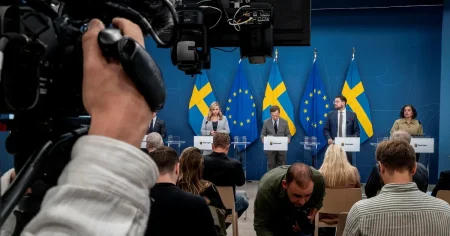The Swedish government’s commitment to transparency in political financing is facing a potential roadblock. In June 2023, the government established a committee, known as the ”Transparency Committee,” tasked with reviewing the existing regulations governing political party funding. The committee, led by prominent legal expert Mats Melin, was specifically charged with investigating whether organizations in the labor market, particularly trade unions, should be required to obtain consent from individual members before making donations to political parties. This provision, if implemented, would significantly impact the Swedish Trade Union Confederation (LO), a major contributor to the Social Democratic Party’s coffers.
The committee was initially expected to submit its report by February 15, 2024. However, according to an internal email from Melin to committee members, comprised of parliamentarians from all parties, the government has decided to extend the committee’s mandate by three months. This extension specifically directs the committee to further investigate how the proposed consent requirement for union members could be implemented, regardless of the committee’s initial assessment. This directive comes in the wake of the committee’s preliminary conclusion that such a requirement could infringe upon constitutionally protected freedom of association, a finding documented in materials reviewed by the Swedish newspaper, Dagens Nyheter (DN).
The crux of the committee’s concern lies in the potential restriction on the right to form associations that ”work for common purposes.” Melin’s team has determined that the legal uncertainty surrounding the proposed consent requirement is significant enough to warrant caution against its implementation. The government, however, appears dissatisfied with this conclusion, prompting the extension and the additional directive. Melin confirmed the impending extension, noting that while formal confirmation from the government was expected the following week, he understood the extension would be granted, along with the specific instruction to further investigate the consent requirement for union member donations.
While Melin declined to elaborate on the committee’s internal deliberations before the completion of its work, the implications of the government’s intervention are raising concerns. DN’s attempts to contact the Social Democratic Party for comment were met with a refusal. However, an anonymous source within the party characterized the government’s move as “unpleasant,” particularly in light of recent government proposals to tighten regulations on political lotteries, another key source of funding for the Social Democrats. This source expressed concern that the government was systematically targeting the opposition’s funding sources, a move they considered detrimental to democratic principles.
The situation highlights a complex interplay between transparency, freedom of association, and the potential for political maneuvering. The government’s insistence on pursuing the consent requirement, despite the committee’s concerns about its constitutionality, raises questions about the underlying motivations. Critics argue that this move could disproportionately impact the Social Democrats, the primary recipient of LO’s financial support. Furthermore, the government’s recent focus on regulating alternative funding streams for political parties, such as lotteries, reinforces the perception of a targeted campaign against opposition financing.
The ongoing debate underscores the delicate balance required in regulating political financing. While transparency is a laudable goal, it must be pursued in a manner that respects fundamental rights, such as freedom of association. The government’s actions in this case raise concerns about potential overreach and the possibility of using regulatory changes to gain political advantage. The coming months will be crucial in determining whether the final recommendations of the Transparency Committee will prioritize constitutional protections alongside transparency goals, or whether the government will push forward with measures that could reshape the landscape of political financing in Sweden.














